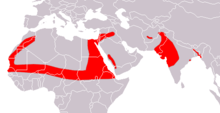The greater mouse-tailed bat (Rhinopoma microphyllum) is a species of bat in the Rhinopomatidae family.[2]
| Greater mouse-tailed bat | |
|---|---|

| |
| Scientific classification | |
| Domain: | Eukaryota |
| Kingdom: | Animalia |
| Phylum: | Chordata |
| Class: | Mammalia |
| Order: | Chiroptera |
| Family: | Rhinopomatidae |
| Genus: | Rhinopoma |
| Species: | R. microphyllum
|
| Binomial name | |
| Rhinopoma microphyllum (Brünnich, 1792)
| |

| |
| Greater mouse-tailed bat range | |
Range and habitat
editIt is found in Algeria, Bangladesh, Burkina Faso, the Central African Republic, Chad, Djibouti, Egypt, Eritrea, Ethiopia, India, Indonesia, Iran, Israel, Iraq, Jordan, Libya, Mali, Mauritania, Morocco, Myanmar, Niger, Nigeria, Oman, Pakistan, Saudi Arabia, Senegal, Sudan, Thailand, Tunisia, Western Sahara, and Yemen. Its natural habitat is subtropical or tropical dry shrubland.
Biology and ecology
editAccording to a recent research published in Royal Society of London, the greater mouse-tailed bat hibernates at the unusually warm and constant temperature of 68 °F in caves in Israel's Great Rift Valley. From October to February, these bats were discovered semi-conscious, breathing only once every 15–30 minutes, with extremely low energy expenditures.[3]
The species Rhinopoma microphyllum eats exclusively insects.[4] A study on its diet revealed that the species is primarily a Coleoptera feeder in both maternity and summer quarters, although a more diverse feeding habit is found in the summer roosts. Other prey types include Diptera, Neuroptera and Hymenoptera.[5] They mate at the beginning of spring.
References
edit- ^ Monadjem, A.; Palmeirim, J.; Aulagnier, S. (2017). "Rhinopoma microphyllum". IUCN Red List of Threatened Species. 2017: e.T19600A21998943. doi:10.2305/IUCN.UK.2017-2.RLTS.T19600A21998943.en. Retrieved 17 November 2021.
- ^ Schlitter, Duane A.; Qumsiyeh, Mazin B. (1996). "Rhinopoma microphyllum" (PDF). Mammalian Species (542): 1–5. doi:10.2307/3504243. JSTOR 3504243.
- ^ Eran Levin; Brit Plotnik; Eran Amichai; Luzie J. Braulke; Shmulik Landau; Yoram Yom-Tov; Noga Kronfeld-Schor (April 2015). "Subtropical mouse-tailed bats use geothermally heated caves for winter hibernation". Proceedings of the Royal Society B: Biological Sciences. 282 (1804): 20142781. doi:10.1098/rspb.2014.2781. PMC 4375864. PMID 25740890.
- ^ Krause, Jennifer. "Great Mouse-Tailed Rat".[permanent dead link]
- ^ Hemmati, Zeinab; Sharifi, Mozafar. ""Variation in the Diet of the Greater Mouse-Tailed Bat, Rhinopoma Microphyllum (Chiroptera: Rhinopomatidae) in South-Western Iran." Taylor & Francis". doi:10.1080/09397140.2002.10637923. S2CID 84603080.
{{cite journal}}: Cite journal requires|journal=(help)
